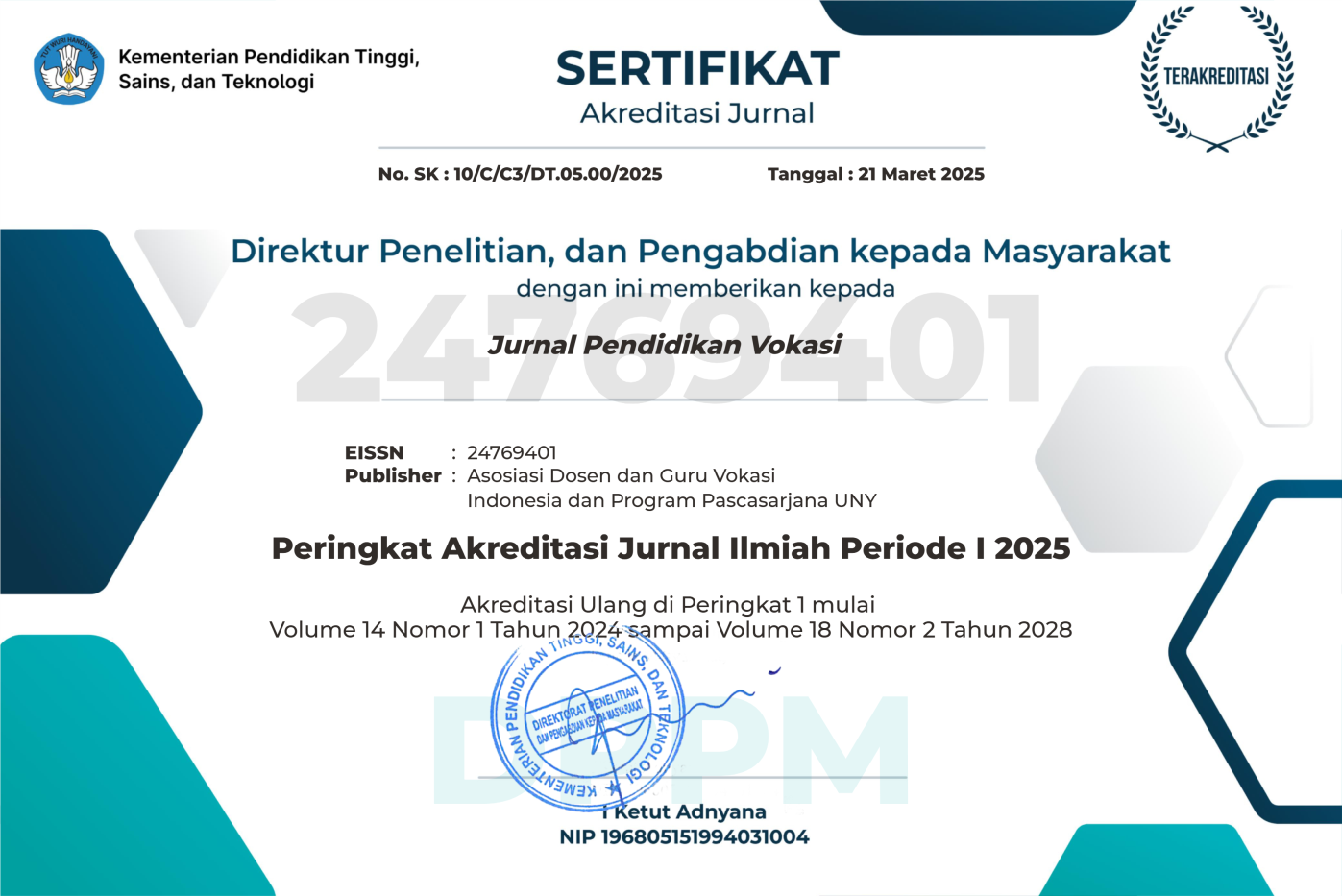Integrated work-based learning (I-WBL) model development in light vehicle engineering competency of vocational high school
DOI:
https://doi.org/10.21831/jpv.v8i1.14360Keywords:
development, model, Work-Based Learning (WBL), integrationAbstract
This research is to (1) analyze the implementation of new field project; (2) develop conceptual model of WBL integrated to industry; (3) test the validity of WBL integrated; (4) test the effectiveness of integrated WBL. This is educational and development research using randomized pretest-posttest and controlled group design. The population was all vocational school students. The research was conducted from March to December 2016. Data were collected by listing, using observation sheet, interviewing guidline and documenting. Validating was done by some experts. The data were analyzed in descriptive and multivariate Analysis of Variance by SPSS.17. The result shows that (1) the implementation field project has some weaknesses; (a) the schools are less prepared to plan the program, place and MoU; (b) schools never formally invite outside; (c) not all schools have a guidance to do a field project and schools only measure student's skill aspect after doing field project; (2) developing model through philosophical level, theoritical level, methodological level, dan classroom practice; (3) after validation of the guidance book by 12 experts, it shows the average score up to 4; (4) The group using WBL is more effective than that using field project in increasing the student'.
References
Becker, G. S. (1975). Human capital, a theoretical and empirical analysis, with special reference to education. Washington: National Bureau of Economic Research, Inc.
Billet, S. (2011). Vocational education, purpose, tradition and prospect. New York: Springer.
Boud, D. S. N. (2001). Work based learning: a new higher education. Buckingham: Open University Press.
Brite, J. (2013). Arizona work-based learning resource guide. West Jefferson: Lynne Bodman Hall.
Dittrich, J. (2009). Standardisation in TVET teacher education. Alle Reche vorbehalten: Peter Lang GmbH.
Djojonegoro, W. (1998). Pengembangan sumberdaya manusia melalui sekolah menengah kejuruan (SMK). Jakarta: PT Balai Pustaka.
Ghozali, A. (2010). Ekonomi pendidikan. Jakarta: Lembaga Penelitian UIN Syarif Hidayatullah.
Joyce, B., Weil, M., & Calhoun, E. (2009). Models of teaching (8th ed.). Yogyakarta: Pustaka Pelajar.
Kuswana, W. S. (2013). Filsafat pendidikan teknologi, vokasi dan kejuruan. Bandung: Alfabeta.
Murphy, P., & McCormick, R. (2008). Knowledge an practice, representations and identities. London: Sage.
Pavlova, M. (2009). Technology and vocational education for sustainable development: Empowering individuals for the future (Vol. 10). Queensland: Springer Science & Business Media.
Sandika, I. K. B., Slamet, S., & Usman, H. (2017). Partnership model of vocational education with the business sector in civil engineering expertise program of Vocational Secondary Schools. Jurnal Pendidikan Vokasi, 7(3), 247–261. https://doi.org/10.21831/jpv.v7i3.9383
Suyitno, S. (2016). Pengembangan multimedia interaktif pengukuran teknik untuk meningkatkan hasil belajar siswa SMK. Jurnal Pendidikan Teknologi Dan Kejuruan, 23(1).
Wibawa, B. (2005). Pendidikan teknologi dan kejuruan: manajemen dan implementasinya di era otonomi. Surabaya: Kertajaya Duta Media.
Wiyanto, T., Samani, M., & Sugiyono, S. (2017). The developing teaching practice model as an effort to improve the quality of mechanical engineering vocational school teachers. Jurnal Pendidikan Vokasi, 7(3), 349–363. https://doi.org/10.21831/jpv.v7i3.17923
Downloads
Published
How to Cite
Issue
Section
Citation Check
License
The authors submitting a manuscript to this journal agree that, if accepted for publication, copyright publishing of the submission shall be assigned to Jurnal Pendidikan Vokasi. However, even though the journal asks for a copyright transfer, the authors retain (or are granted back) significant scholarly rights.
The copyright transfer agreement form can be downloaded here: [JPV Copyright Transfer Agreement Form]
The copyright form should be signed originally and sent to the Editorial Office through email to jpvokasi@uny.ac.id
Jurnal Pendidikan Vokasi by http://journal.uny.ac.id/index.php/jpv is licensed under a Creative Commons Attribution-ShareAlike 4.0 International License.












